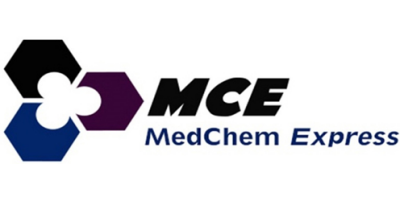

- Home
- Companies
- MedChemExpress LLC (MCE)
- Products
- MedChemExpress - Model Semapimod ...
MedChemExpress - Model Semapimod tetrahydrochloride - 164301-51-3
Semapimod tetrahydrochloride (CNI-1493), an inhibitor of proinflammatory cytokine production, can inhibit TNF-α, IL-1β, and IL-6. Semapimod tetrahydrochloride inhibits TLR4 signaling (IC50≈0.3 μM). Semapimod tetrahydrochloride inhibits p38 MAPK and nitric oxide production in macrophages. Semapimod tetrahydrochloride has potential in a variety of inflammatory and autoimmune disorders[1][2][3].MCE products for research use only. We do not sell to patients.
Semapimod tetrahydrochloride
MCE China:Semapimod tetrahydrochloride
Brand:MedChemExpress (MCE)
Cat. No.HY-15509A
CAS:164301-51-3
Synonyms:CNI-1493; CPSI-2364 tetrahydrochloride
Purity:98.43%
Storage:-20°C, sealed storage, away from moisture and light *In solvent : -80°C, 6 months; -20°C, 1 month (sealed storage, away from moisture and light)
Shipping:Room temperature in continental US; may vary elsewhere.
Description:Semapimod tetrahydrochloride (CNI-1493), an inhibitor of proinflammatory cytokine production, can inhibit TNF-α, IL-1β, and IL-6. Semapimod tetrahydrochloride inhibits TLR4 signaling (IC50≈0.3 μM). Semapimod tetrahydrochloride inhibits p38 MAPK and nitric oxide production in macrophages. Semapimod tetrahydrochloride has potential in a variety of inflammatory and autoimmune disorders.
In Vitro:Semapimod tetrahydrochloride leads to a significant decrease of p38-MAPK phosphorylation in macrophages, proinflammatory gene expression of macrophage inflammatory protein-1alpha, interleukin-6, monocyte chemoattractant protein-1, and intercellular adhesion molecule-1, and neutrophil infiltration. Semapimod tetrahydrochloride completely abrogated nitric oxide production within the tunica muscularis[2]. Semapimod tetrahydrochloride desensitizes TLR signaling via its effect on the TLR chaperone gp96. Semapimod tetrahydrochloride inhibits ATP-binding and ATPase activities of gp96 in vitro (IC50≈0.2-0.4 μM). Semapimod tetrahydrochloride desensitizes TLR signaling via its effect on the TLR chaperone gp96[3]. Semapimod (0-500 nM) inhibits microglia-stimulated GL261 invasion[4]. Semapimod (0-10 µM) dose not affect serum-stimulated glioblastoma cell invasion, even at 10 µM, underlining the selectivity of semapimod for cells from the monocytic lineage[4]. Semapimod (200 nM) does not affect microglia-stimulated glioblastoma cell proliferation[4].
In Vivo:Semapimod tetrahydrochloride (5 mg/kg; i.p; daily for 2 weeks) ameliorates endothelial dysfunction in Obese Zucker (OZ) rats[1]. Semapimod tetrahydrochloride restores AM-induced akt phosphorylation and cGMP production in OZ rats[1]. Semapimod (6 mg/kg/day, Intracranially for 1 week) inhibits glioblastoma cell invasion in vivo[4]. Semapimod (intracranially administered, 2 weeks) semapimos strongly increases the survival of GL261 tumor-bearing animals in combination with radiation, but has no significant benefit in the absence of radiation[4].
IC50 & Target:IL-1β IL-6 p38 MAPK
Hot selling product:Dihydrotanshinone I | Creatinine | Uracil | Posaconazole-d5 | Levalbuterol (hydrochloride) | PLX7904 | EACC | Gum guaiac | Pinaverium bromide | Ginsenoside Re
Trending products:Recombinant Proteins | Bioactive Screening Libraries | Natural Products | Fluorescent Dye | PROTAC | Isotope-Labeled Compounds | Oligonucleotides
References:
[1]. Nishimatsu H, et al. Blockade of endogenous proinflammatory cytokines ameliorates endothelial dysfunction in obese Zucker rats. Hypertens Res. 2008;31(4):737‐743. [Content Brief]
[2]. Wehner S, Set al. Inhibition of p38 mitogen-activated protein kinase pathway as prophylaxis of postoperative ileus in mice. Gastroenterology. 2009;136(2):619‐629. [Content Brief]
[3]. Wang J, et al. Experimental Anti-Inflammatory Drug Semapimod Inhibits TLR Signaling by Targeting the TLR Chaperone gp96. J Immunol. 2016;196(12):5130‐5137. [Content Brief]
[4]. Miller IS, et al. Semapimod sensitizes glioblastoma tumors to ionizing radiation by targeting microglia. PLoS One. 2014 May 9;9(5):e95885. [Content Brief]
Brand introduction:
• MCE (MedChemExpress) has a global exclusive compound library of more than 200 kinds, and we are committed to providing the most comprehensive range of high-quality small molecule active compounds for scientific research customers around the world;
• More than 50,000 highly selective inhibitors and agonists are involved in various popular signaling pathways and disease areas;
• The products cover a variety of recombinant proteins, peptides, commonly used kits, more PROTAC, ADC and other characteristic products, widely used in new drug research and development, life science and other scientific research projects;
• Provide virtual screening, ion channel screening, metabolomics analysis detection analysis, drug screening and other professional technical services;
• It has a professional experimental center and strict quality control and verification system;
• Provide LC/MS, NMR, HPLC, chiral analysis, elemental analysis and other quality inspection reports to ensure the high purity and high quality of products;
• The biological activity of the products has been verified by the experiments of customers in various countries;
• A variety of top journals such as Nature, Cell, Science and pharmaceutical patents have included the scientific research results of MCE customers;
• Our professional team tracks the latest pharmaceutical and life science research and provides you with the latest active compounds in the world;
• It has established long-term cooperation with the world's major pharmaceutical companies and well-known scientific research institutions。
